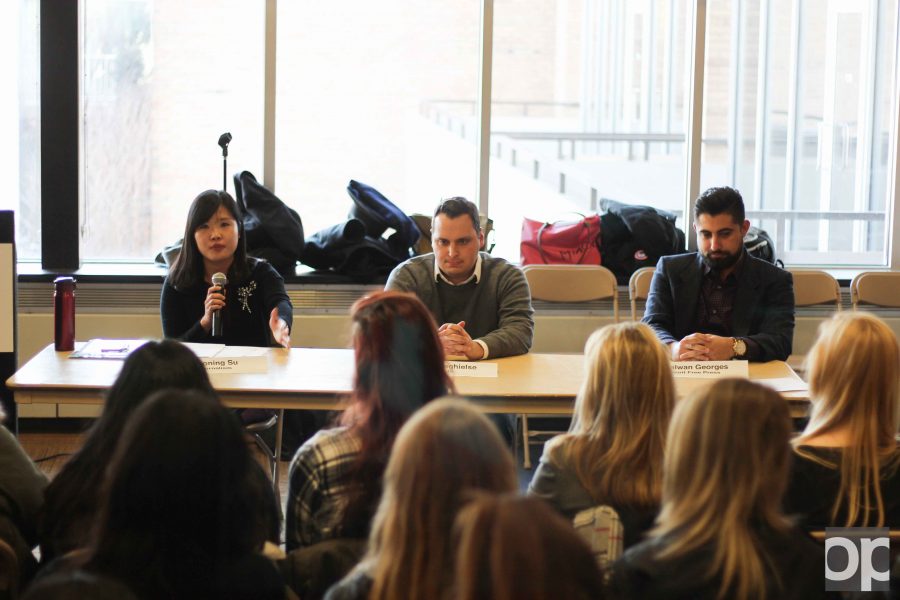Panel discusses future of journalism
Dr. Chiaoning Su (far left) speaks at the journalism panel on Thursday, Feb. 9 about “The Role of a Threatened Press in a Post-Truth World.
It’s no secret that the press has been floundering since the 2016 presidential election. But this didn’t start recently. According to a September 2016 Gallup poll, only 32 percent of Americans trust the mass media, and trust in the mass media has been sliding since 2004. The poll also reported that only 14 percent of Republicans trust the press, while 51 percent of Democrats support the press. President Donald Trump’s frequent accusations of the media publishing false news stories about him have swirled since he first tossed his hat into the ring.
The question “How can we make this better?” was discussed by Oakland University journalism students, faculty, alumni and reporters during the panel “The Role of a Threatened Press in a Post-Truth World,” which was held Thursday, Feb. 9 in Fireside Lounge.
Hosted by the journalism department and moderated by Director of the Journalism Program Garry Gilbert, the six panelists debated and answered questions from the audience, filled mostly with concerned journalism students and faculty.
The panelists were Chiaoning Su, journalism and public relations professor; Peter Trumbore, associate professor of political science; John Stoll, OU alumnus and Detroit bureau chief of The Wall Street Journal; Ross Maghielse, OU alumnus and audience engagement editor of the Guardian U.S.; Jonathon Oosting, political reporter at The Detroit News; and Salwan Georges, OU alumnus and photographer at the Detroit Free Press.
Much of the discussion centered on the role the media played in the election and if mainstream news outlets showed favoritism.
“I think there are trust issues . . . from the general public,” Maghielse said.
Trumbore ssid the job of the press is to help the general public sort out the truth from the fiction. However, the media often reports the obviously false statement first, so that is what people remember.
“The media will report the statement first, and then the debunking after,” Trumbore said.
The panelists also discussed how easy it is for readers and viewers to reinforce what they already believe through confirmation bias, which is easier than ever to do because of all the partisan information at the world’s fingertips. People simply choose to read what reinforces their beliefs rather than challenges them. Another issue that was discussed at the panel was people living in partisan bubbles on social media that only echo what they agree with.
Even though political ideologies seem to bitterly divide America, Stoll called the discourse “chaotic, but also rich.”
Although going into the journalism field may seem like a treacherous decision at the moment, Maghielse and Stoll said future journalists shouldn’t expect all doom and gloom.
“There [are] a lot of opportunities in the journalism field because we need ideas, and if you have that, you can go a long way very quickly,” Maghielse said.
Both Maghielse and Stoll said the education and experiences they had at Oakland helped them with their jobs and they were fortunate to attend the school.
Stoll said that journalism is a rewarding profession that can have immediate impact.







